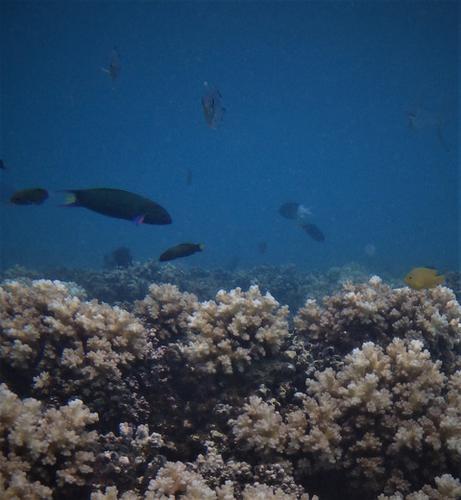当前位置:
X-MOL 学术
›
Funct. Ecol.
›
论文详情
Our official English website, www.x-mol.net, welcomes your feedback! (Note: you will need to create a separate account there.)
Coral degradation impairs learning of non-predators by Whitetail damselfish
Functional Ecology ( IF 5.2 ) Pub Date : 2021-03-02 , DOI: 10.1111/1365-2435.13781 Douglas P. Chivers 1 , Mark I. McCormick 2 , Eric P. Fakan 2 , Jake W. Edmiston 2 , Maud C. O. Ferrari 3
中文翻译:

珊瑚退化损害了白尾雀鲷对非捕食者的学习
更新日期:2021-03-02
Functional Ecology ( IF 5.2 ) Pub Date : 2021-03-02 , DOI: 10.1111/1365-2435.13781 Douglas P. Chivers 1 , Mark I. McCormick 2 , Eric P. Fakan 2 , Jake W. Edmiston 2 , Maud C. O. Ferrari 3
Affiliation

|
- A prerequisite for effective antipredator responses is the ability of a prey to distinguish animals that pose a threat from those that do not. Prey often have efficient learning mechanisms to learn threats but learning to recognize nonpredators may be equally or more important. Moreover, the ability to generalize learned information is of key importance for prey animals. Prey take information they know about one species to make ‘educated guesses’ about the predatory/nonpredatory status of other unknown species.
- Here, we investigate the ability of Whitetail damselfish Pomacentrus chrysurus to learn the identity of non-predators and then generalize their responses to other unknown animals. Our work is completed within the context of unprecedented habitat degradation in reef ecosystems. When corals die, the remaining skeleton is colonized by algae, cyanobacteria and sessile invertebrates. These opportunistic colonists change the physical and chemical landscape of the reef and hence the background odour in which predator and non-predator recognition occurs.
- Our results indicated that Whitetail damselfish learn to classify Moonwrasse Thalasomma lunare as a non-predator through the process of latent inhibition, whereby the prey are repeatedly exposed to Moonwrasse odour multiple times in the absence of negative reinforcement. These fish subsequently generalized their nonpredator recognition to other unknown wrasse, but not distantly related fish. Of key importance was our finding that the patterns and extent of non-predator learning and generalization were dramatically altered in dead coral habitats. As predicted, prey that learned the Moonwrasse as a nonpredator in live coral environments did not subsequently respond to Moonwrasse when we tried to teach them Moonwrasse was a predator in live coral. However, this non-predator recognition was reduced in dead coral environments. Moreover, generalization completely failed when we changed from live to dead coral environments.
- Juvenile damselfishes need to rapidly catalogue the identity of unknown animals when they arrive at a reef. Changing background odours, that occur with changing tides and currents, means that prey need to learn non-predator identities separately in each water source. This cognitive challenge likely has significant survival consequence in a changing environment.
中文翻译:

珊瑚退化损害了白尾雀鲷对非捕食者的学习
- 有效的反捕食者反应的先决条件是猎物区分构成威胁的动物和不构成威胁的动物的能力。猎物通常具有学习威胁的有效学习机制,但学会识别非捕食者可能同样重要或更重要。此外,概括所学信息的能力对于猎物动物至关重要。猎物利用他们了解的一个物种的信息对其他未知物种的掠夺性/非掠夺性状态进行“有根据的猜测”。
- 在这里,我们调查了白尾雀鲷 Pomacentrus chrysurus了解非捕食者身份,然后将它们的反应概括为其他未知动物的能力。我们的工作是在珊瑚礁生态系统前所未有的栖息地退化的背景下完成的。当珊瑚死亡时,剩余的骨骼被藻类、蓝细菌和无柄无脊椎动物殖民。这些机会主义殖民者改变了珊瑚礁的物理和化学景观,从而改变了捕食者和非捕食者识别发生的背景气味。
- 我们的结果表明,怀特泰尔雀鲷学会对 Moonwrasse Thalasomma lunare进行分类作为通过潜在抑制过程的非捕食者,猎物在没有负强化的情况下多次反复暴露于 Moonwrasse 气味中。这些鱼随后将它们的非捕食者识别推广到其他未知的濑鱼,但不是远亲的鱼。至关重要的是,我们发现死珊瑚栖息地中非捕食者学习和泛化的模式和范围发生了显着变化。正如预测的那样,当我们试图教他们月鱼是活珊瑚中的捕食者时,在活珊瑚环境中学习月鱼作为非捕食者的猎物随后不会对月鱼做出反应。然而,这种非捕食者的识别在死珊瑚环境中减少了。此外,当我们从活珊瑚环境变为死珊瑚环境时,泛化完全失败。
- 幼鱼到达珊瑚礁时需要快速记录未知动物的身份。随着潮汐和水流的变化,背景气味的变化意味着猎物需要在每个水源中分别学习非捕食者的身份。在不断变化的环境中,这种认知挑战可能会对生存产生重大影响。



























 京公网安备 11010802027423号
京公网安备 11010802027423号